At Dell Technologies World in Las Vegas, Dell EMC launched a new training and inferencing platform. The Dell EMC DSS8440 is a 4U server that is optimized for expansion and is a long-awaited entry by the company into the training space. The Dell EMC DSS 8440 headlines support for up to ten PCIe based GPUs in the company’s push for deep learning and inferencing throughout its portfolio.
Dell EMC DSS 8440 Overview
At Dell Technologies World 2019, the company showed off the DSS 8440 with NVIDIA Tesla V100 GPUs. The company offers varying numbers of GPUs along with different memory sizes.
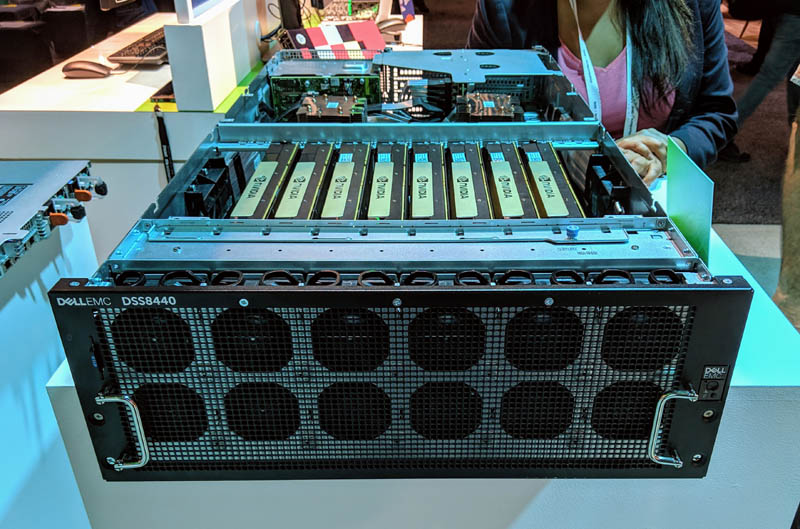
These GPUs are fitted on a PCB that handles PCIe slots which is separate from the motherboard. Perhaps the most differentiating feature here is that the Dell EMC DSS 8440 faces the PCIe I/O plates in the middle of the chassis while making the entire front of the chassis a fan wall instead of using it for hot swap storage. We have reviewed eight and ten GPU systems from a number of vendors including our recent Inspur Systems NF5468M5 Review 4U 8x GPU and every other competitive system we reviewed puts GPU I/O at the rear (or front) of the chassis. Dell EMC says that this design ensures cool airflow comes from the inlet hitting the high-value GPUs first.
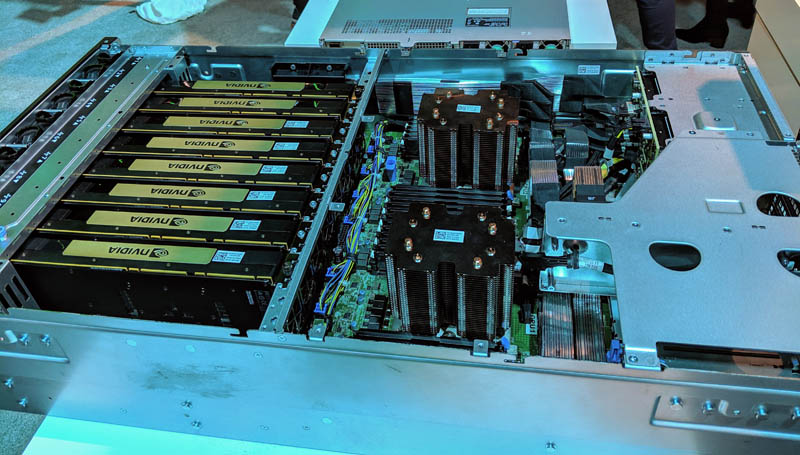
In terms of processors, the system is a dual LGA3647 solution for Intel Xeon Scalable processors. This includes 2nd Gen Intel Xeon Scalable processors with Intel Optane DCPMM support.
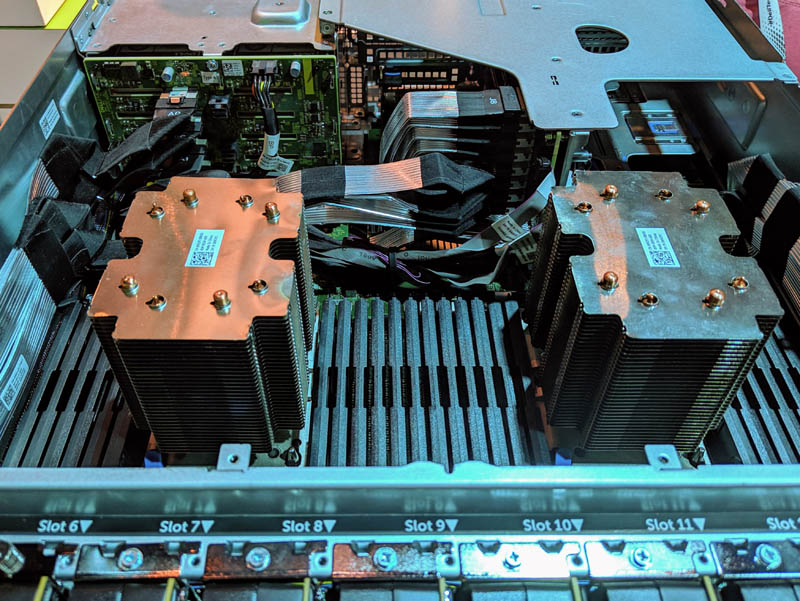
At the rear of the chassis, Dell has an array of ten drives which can be NVMe or SAS/ SATA. There are four 2.4kW power supplies as well as a massive array of PCIe slots for fabric and other devices.
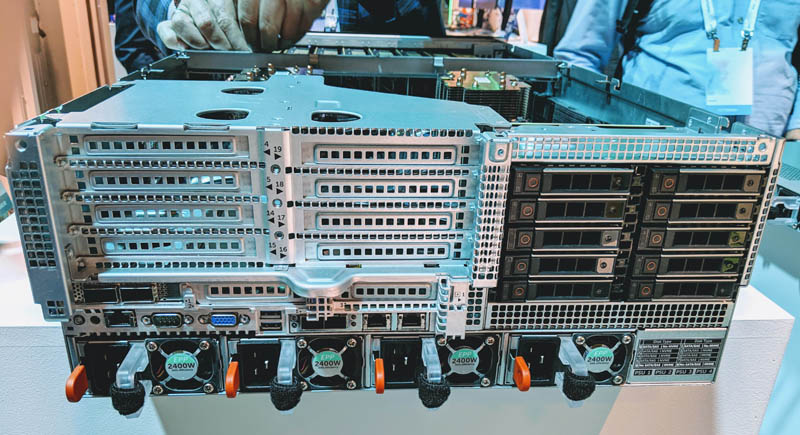
Here is a video overview of the platform:
Final Words
This is a platform that Dell EMC needed. 8x and 10x GPU systems are very popular in the market. Using a cabled PCIe solution allows Dell EMC to upgrade the server making only minor changes if a customer wants. The company is also getting a lot of rear I/O compared to competitive options, albeit sacrificing storage with the design.
During the show, we asked Thierry Pellegrino VP of Business Strategy & HPC Solutions at Dell EMC about support for RTX cards like the GeForce RTX 2000 series and Quadro RTX (which incidentally NVIDIA allows in servers.) Thierry said that Dell EMC would follow NVIDIA’s usage requirements which means no validating GeForce RTX cards in the near future. He also highlighted the versatility of the machine insofar as it can be used both for training and inferencing. There was a slight nod to the fact that Dell EMC works with its partners on multi-generational roadmaps and that this was a platform the company sees a strong future for.
For STH readers, this is likely going to seem long overdue, but we are excited to see Dell EMC enter the 4U eight and ten GPU market.

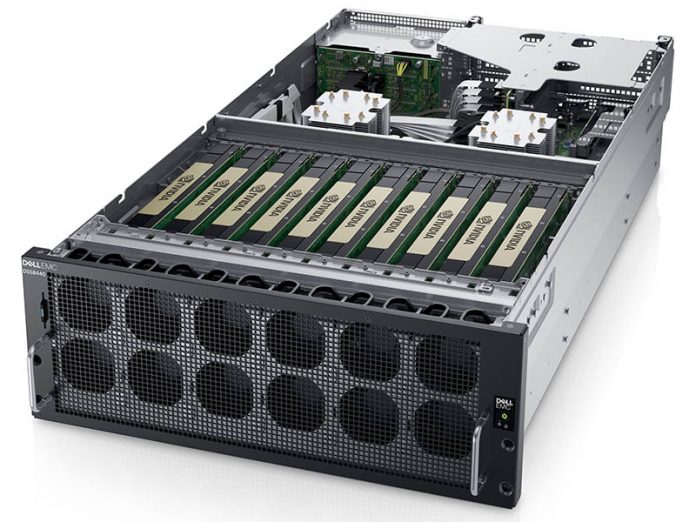
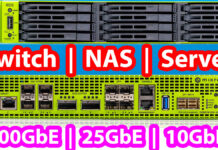
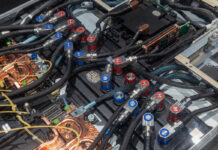
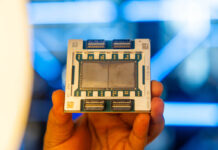
Has Dell stated how they’re distributing the PCIe lanes? E.g. are they running an 8x link directly from the CPUs to each GPU or are they using PCIe switches to multiplex larger links like 16x or even 32x?
And the winner is…. Broadcom with their PLX-switches.
I heard that OCTOMINER will come out with a similar 10 GPU (10 GPU , PCIE GEN3 X8) system soon, it should be much better bang for the buck for the computing power. Obviously Dell has some more high end features but depending on the application, price is also an important factor.
I wonder when we will see such a server using EPYC CPU’s, only the G291-Z20 from Gigabyte comes to mind but don’t like that horizontal card layout.
@K8s
Yep the G291-Z20 does (2x 8 GPU’s=)16GPU’s in a (2x2U=)4U height, way to efficient.
The G291-Z20 also gives more PCIe-3 bandwidth to the GPU’s.
The vendor that makes a dual Epyc GPU platform with PCIe gen 4 support first will win…
Should be good for a 12 GPU system without PLX and leave plenty of lanes for storage.
Rumours are that dual EPYC ROME will have 160+2 PCIe-4 lanes.
Will we ever see an AI/ML review/comparisons of the MI60’s /MI50’s all EPYC machines????
AMD’s marketing budget is smaller, so I wouldn’t count on it.
Many years ago, when we did our first 8x GPU server review in 2015, it had 8x AMD FirePro cards: https://www.servethehome.com/supermicro-4028gr-tr-4u-8-way-gpu-superserver-review/
Part of it, you are right, is that it is harder for us to get a large set of cards (even on the NVIDIA side.) We also do not have as much demand for the AMD cards for the hosted demo side. If I have to put an investment dollar to work, I have to put it where we have demand.